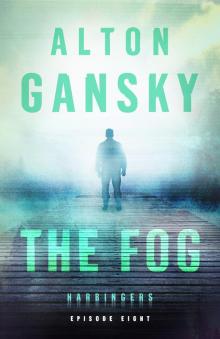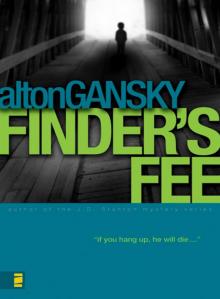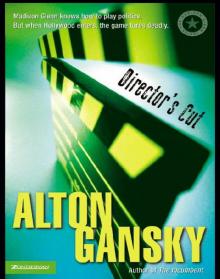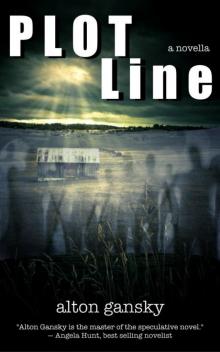- Home
- Alton Gansky
Plot Line Page 2
Plot Line Read online
Page 2
“I want to hire you to work for me. Just like I said when we sat down to lunch. You’re a man of unique skill and creativity. It’s a crime that you’re not a best selling author. I believe you will be someday, in fact, I may be able to help in that area.”
Ray shook his head. “I don’t want to veer off course. I need to stay with the plan. It’s the only way I’ll make it.”
“You can still write your novels, Mr. Beeman. Write them to your heart’s content. All I ask is that you give us some time when we need you. You’ll be on retainer. I’ll see to it you get paid monthly whether you do any work or not.”
“You’ll pay me a salary whether or not I produce anything for you?”
“This isn’t full time employment. You will be needed from time to time and when we need you, you must be there. The rest of the time is yours to do with as you see fit.”
The offer seemed too good. What wasn’t Devlin saying? Ray pushed aside his bowl of salad. “Just who is this we you keep mentioning.”
“I work for a department in the government,” Devlin said. “We do research.”
“What department?” Ray pressed.
“You wouldn’t recognize it. We keep a low profile.”
“CIA?”
Devlin laughed. “No, not at all. We’re not CIA, DIA, FBI or any other espionage department. We’re not spies, Mr. Beeman. I don’t know if that’s a relief or a disappointment for you.”
“Relief. What do you need a writer for? Why me? I’ve never written anything for the government.”
“That’s the point. I can get some kid fresh out of college if all I needed was someone to write reports. I’m looking for a unique mind, a creative mind. A novelist doesn’t think like the rest of the world. He sees things others can’t. Just like an architect can look at a two-dimensional drawing and see a three-dimensional building, a novelist can look at everyday life and make a mystery or a suspense book from it. It is a distinctive and matchless gift.”
“But what does the government need with a fiction writer?”
Devlin leaned back in his chair and said, “That’s one of those things I can’t talk about until you’re onboard. It wouldn’t be prudent.”
“I don’t know,” Ray said. “This is coming out of nowhere.”
“I don’t need an answer now.” He reached in the front pocket of his sport coat and drew out a business card. It was a simple white card that read DEVLIN CHAMBERS and had a phone number. “That’s my private number. Go home and think about it. I know you’ll make the right decision.” He leaned forward again. “Think of it Ray, freedom to write, to use the creative genius locked in your head.”
Ray took the card and studied it for a moment. He was in dire financial straights and his career could be over. If so, he needed a job—badly. “I’ll think about it.”
“That’s all I ask,” Devlin said. “That’s all I ask.”
Two
Ray sat on the old and worn bench of the picnic table centered in his backyard. A three-quarter-moon cast ivory light through a sheet of diaphanous clouds.
It was nearly 8:30 in the evening and he hadn’t seen his wife or his daughter. At first he was angry, then concerned. It was then he remembered Nora telling him that morning that she and Skeeter would be gone when he got home. Nora was visiting her sister in Fontana and Skeeter was at church. The plan was for her to pick their daughter up on the return trip from her sister’s. He expected them any moment.
Upon reflection, Ray decided, it was good to be alone. The news of his publisher’s bankruptcy had shaken him deeply. Everything Devlin said earlier had been true. It could take months, maybe even years to land a new publisher, and what was he to do in the meantime? Ray felt as if his heart had been cut out and handed to him—still beating. His emotions cycled through the extremes, one moment angry, the next depressed to the point of tears. During the hours of solitude, he had played and replayed his options. He could return to his former job, but the thought of hour after hour of mind-numbing work writing computer programs made him ill. He’d rather grill hamburgers at minimum wage. He would not go back to that kind of work again.
Devlin was correct; the writer’s mind was different. He needed a creative outlet. No matter how hard the work of writing, no matter how slow the words came, he had to write. Writing wasn’t a desire it was a compulsion. The only time he wasn’t thinking about writing was when he was asleep, and even then he dreamed about plots, characters, and action. If he took a nine-to-five job, he would be relegated to writing in the evenings and on the weekends. That wouldn’t go over well with Nora. He wrote his first book that way and several times she threatened to leave him.
Nora was a good woman at heart, but her Irish-quick temper had always been a problem. How different his daughter was. She was as emotionally level as any man or woman he had ever met. Just fifteen-years-old, she at times seemed fully adult, while at other times little more than a school girl. Ray smiled as his mind rewound the years. He recalled her running through the house, her arms held out to the side and making a buzzing sound. She was trying to be an airplane, but sounded like a mosquito. He had called her Skeeter ever since. Nora insisted on calling her by her given name, Amy. Hair black as coal, skin the color of cream, eyes a glacier blue. Boys flocked to her, but so far she had turned down all their requests for dates. She was a young woman with her own mind, not easily manipulated. She was every father’s dream.
The sound of the screen door banging against the jamb echoed through the thick night air. It sounded like a clap of thunder and Ray jerked. Turning, he saw the thin form of his wife marching across the small yard.
“You’re home.” Ray smiled. “I didn’t hear the car.”
“What are you doing out here?” Nora’s voice had an edge to it. “It’s cold.” She was a tall woman with fawn hair that hung to her shoulders. At thirty-nine, she still looked youthful, but age was crouching at the door. Just the other night, he had noticed a few gray hairs. He said nothing. Her eyes were blue, but several shades darker than Skeeter’s.
“Just thinking. How’s your sister?”
“You have a lot to think about.” Ray could tell she was upset. That was all he needed now: one more problem; one more log on an emotional fire that already burned too hot.
“What do you mean?”
She pulled her full lips into a tight line. “You know what I’m talking about. When were you going to tell me?”
How could she know? Before he could answer, Nora fired another volley of words. “Do you think I like finding out about these things from your agent?”
That explained it. “I didn’t know about it until I was at the book signing. I got a letter in the mail. I couldn’t tell you before now, because we were both gone.”
“You could have called me.”
“Where? At your sister’s? What good would that do?”
“You shouldn’t keep things from me.”
“I’m not keeping things from you. I was going to tell you when you got home. Lighten up.”
“You’ve just lost your next paycheck and you’re telling me to lighten up. In case you haven’t noticed, our saving account is down to $2,000 and we have a stack of bills waiting to be paid. I can’t support this family alone.”
“No one is asking you to. Now sit down and let’s talk about this.”
“I’m not sitting out here, it’s too cold. Besides, there isn’t much to talk about. You will have to start looking for work. I want you to call Soft-Ware tomorrow. Maybe they’ll take you back.”
“I’m not going back there.”
“You’re not going to sit around here and do nothing . . .”
“I’m not going back there!” Ray shouted. “And I’m not going to sit around doing nothing! I never have, I never will.”
“Sometimes I just don’t understand you,” Nora shouted back.
“You’ve never tried.”
“That’s unfair,” Nora protested. Ray could hear the hurt in her v
oice. She was frightened, and she had good reason to be. She was also correct; he did have to do something.
“This whole conversation is unfair,” Ray said softly yet firmly. “I’m not going to let the family starve, Nora. We’re not going to lose the house. Everything is going to be fine, I’ll make sure of it.”
They fell silent as the night. Ray knew he was a disappointment in his wife’s eyes. She had never understood his need to write. To her it had always been a diversion or an unrealistic dream. Sure there were famous writers, but they were few. Not for a second had she ever caught a glimpse of his dream. He doubted she ever would.
Nora wrapped her arms around herself trying to ward off the cold and bounced on the balls of her feet. After another few moments of silence, she said, “You should come into the house. You don’t want to catch a cold.”
Ray smiled. It was her way of showing concern. “I will in a few minutes. I want to sort a few things out in my mind.”
Nora turned without a word and trod back to the house.
A few minutes later, Ray heard the screen door open and close, this time softly. He didn’t turn. Steps made soft by the thick grass drew closer.
“Hi ya, Pops.” It was his daughter. Just hearing her voice made him feel better.
“Hi, Skeeter. How was church?”
“Great. The pastor gave a wonderful Bible study. You would’ve enjoyed it.”
“Think so, huh?” Ray avoided church except on Easter. A solitary man, he found the crowds uncomfortable, the songs foreign, and the sermons unchallenging. He never felt as if he belonged.
“Mom told me about your publisher. I’m sorry.”
Ray looked into his daughter’s face and saw genuine heartache. “Thanks, honey. It was quite a shock.”
“It’s not the end, you know. You have a great talent. I think God will use it in ways we can’t see yet.”
“If so, He has an odd way of showing it.”
Skeeter sat next to Ray. Her thin body radiated heat. She wore blue jeans and a tee shirt with the name of a local college imprinted on it. “Odd isn’t always bad.”
Ray put his arm around his daughter. She had always been the spiritual one in the family, and her faith always seemed genuine. Since so many children her age involved themselves with sex and drugs, he considered himself fortunate to have a daughter who found excitement in religion. At least she wasn’t in a cult. “I’m sorry, sweetheart, I’m a little on edge.”
“It sounded like mom gave you a hard time.”
“You heard that, eh? She wasn’t very sympathetic.”
“I think she’s scared. She always acts angry when she’s frightened.”
It was an accurate insight. “I guess it’s hard to be married to a writer, especially one that’s such a failure.”
“You’re not a failure. Thousands of people wish they could have a book published. You’ve had two.”
“Not bestsellers. If they had been best selling books, then none of this would have mattered. Publishers would be calling me and not the other way around.”
“It will happen, Dad. Give it time.” She shivered.
“Go inside. You’re freezing.”
“I’m going to stay here with you,” she answered.
Ray chuckled. “Is this a sneaky way of getting me to come in from the cold?”
“Yes.”
“Okay, you win. Truth is, I’ve done all the thinking I can do for the night.”
Skeeter put her arm around Ray’s waist and gave him a hug. “It’s going to work out,” she said softly. “I believe in you, and God won’t abandon us.”
Ray gave his daughter a quick kiss on her forehead. “I hope you’re right.”
The evening passed slowly, the sun rising reluctantly. Ray Beeman had been up to greet it. He had been awake for hours. When he stepped from the backyard into the house he found Nora already in bed although it was just a few minutes after nine. It was something she did when upset. Ray walked into the bedroom and saw his wife lying beneath the covers, her back turned toward the door. He doubted she was truly asleep, but moved quietly nonetheless. Closing the door to the master bath behind him, he quickly brushed his teeth and slipped into his pajamas. Although dressed for bed, Ray was too keyed up to sleep. Instead, he returned to the living room and turned on the television. He sat in his dark blue recliner until nearly midnight, convincing himself he was relaxing. He wasn’t.
Skeeter had gone to her room to study. Ray knew she would stay there until bedtime. She never brought home a report card with anything less than an “A” for every class. Kids said she was smart, but she worked harder than anyone he knew.
Once in bed, Ray lay in the dark staring at a ceiling he could not see. The day’s events moved in and out of his thoughts like ghosts haunting a dilapidated Victorian mansion. Although weary, Ray struggled with sleep. His mind raced like a car engine and he had no power to slow it. He could only wait helplessly until sleep overtook him.
When the sun rose, Ray estimated he had slept three hours at most. His eyes were gritty, and a thick film coated the inside of his mouth. Rising gently from bed, he showered and dressed for the day.
With a mug of coffee in his hand, he walked into his office a converted bedroom filled with books and magazines. Mismatching bookshelves lined three of the four walls. Next to the fourth wall was a computer hutch with a Gateway PC nestled inside.
Ray flicked on the overhead light and looked around the room. It was disorganized with manuscripts lying in piles near his desk, and books, which found no room on the shelves, teetered in precarious little towers, ready to fall at the slightest bump.
The computer hummed and the overhead light bathed the beige walls in bright illumination.
The room felt different. He loved his office. It represented him in many ways. Disorganized yet still productive. Here he felt most like a writer; here he could sit hour upon hour typing one letter after another, placing one word after another until a thought was formed and a story told. Today was different. It reminded him he used to be a writer. That letter had changed everything.
Taking a seat at the computer, he moved the mouse bringing the device back to life. A mouse click later he was staring at “Number Three”—his third book: 200 pages of a planned 450. Not quite halfway done. Although he was 50,000 words into the novel, it had no name, no title. He just referred to it as, “Book Three.”
He wanted to write, needed to string his ideas together on the page, but it was so futile now. He could finish the book and place it with another publisher but that would take time—longer if he had to get a nine-to-five job. Despair washed over him.
Leaning back in his chair, he reached for his coffee cup when something poked him in the chest. He wore the same shirt and pants he had worn yesterday. The gentle stick puzzled him at first, and then he remembered. Reaching into the breast pocket, he removed the business card of Devlin Chambers. He studied it for a moment and a portion of the previous day’s conversation returned. Devlin had said, “This isn’t full time employment. You will be needed from time to time and when we need you, you must be there. The rest of the time is yours to do with as you see fit.” Devlin also said the pay was “substantial.”
Ray flicked the card in his fingers, reliving every word Devlin offered. Twenty minutes later, Ray had made up his mind. If what Devlin offered was true, then he had to make the next step.
A sound behind him made Ray turn. Nora stood in the doorway to the office. She was dressed for work in tan slacks and a chocolate brown, long sleeve blouse. He had heard her rise from bed and shower. Uncertain about her mood, he chose to remain cloistered in his office. “You look nice.”
“Thanks,” she replied softly. “Amy tells me I was a little too harsh last night. I’m sorry.”
Nora was a strong woman of Irish stock. Her keen mind could be abducted by her volatile anger. She seldom lost her temper, but when she did the sun and moon backed away. “I know it was a shock. The news didn’t sit we
ll with me either.”
“I could have been more supportive.” Nora leaned against the doorjamb and looked down at her fingers. “I’m just worried. Amy has several school functions coming up and she needs new clothes. I don’t know where the money is going to come from.”
“Did Skeeter say she was worried?”
“No, of course not. She never complains about anything. I don’t think she knows how to worry.”
“How did we ever end up with such a wonderful daughter?” Ray flashed a broad smile.
“Just lucky, I guess.”
“I disagree. I think she comes from good stock.” He winked at her.
For a moment, Nora smiled at the compliment, but the smile quickly melted away. “Are we going to be all right?”
Ray rose, crossed the small office and took his wife in his arms. “It’s going to be fine. Things always work out.” Nora returned the embrace. Ray let a few moments pass as they drew strength from one another. “I was offered a job yesterday.”
Nora pulled back and stared at Ray through eyes brimming with tears. “What?”
Ray recounted his meeting with the mysterious Devlin Chambers. Nora listened intently then said, “Why didn’t you tell me this last night?”
With a shrug, Ray answered, “I wasn’t interested in the job last night. I was still stinging from the news about my publisher. Besides, you weren’t in a listening mood.”
“I suppose you’re right. Do you think the offer is real? People don’t usually just walk up and offer employment out of the blue.”
“I’ve thought about that.” Ray walked back to his desk and picked up Devlin’s business card. “He wasn’t offering jobs to everyone, just to me. He seemed to know my work and that’s what prompted the offer.”
“What do they want you to write?”
“He wouldn’t say. I plan to call him a little after eight and see if I can’t get some more information.” Ray paused, and then added, “He implied the pay was good.”

 At Sea (Harbingers Book 16)
At Sea (Harbingers Book 16) The Fog
The Fog Finder's Fee
Finder's Fee Wounds
Wounds End Game (Harbingers Book 20)
End Game (Harbingers Book 20) Director's Cut
Director's Cut Zero-G
Zero-G By My Hands
By My Hands The Village (Harbingers Book 12)
The Village (Harbingers Book 12) Beneath the Ice
Beneath the Ice Plot Line
Plot Line Submerged
Submerged A Treasure Deep
A Treasure Deep